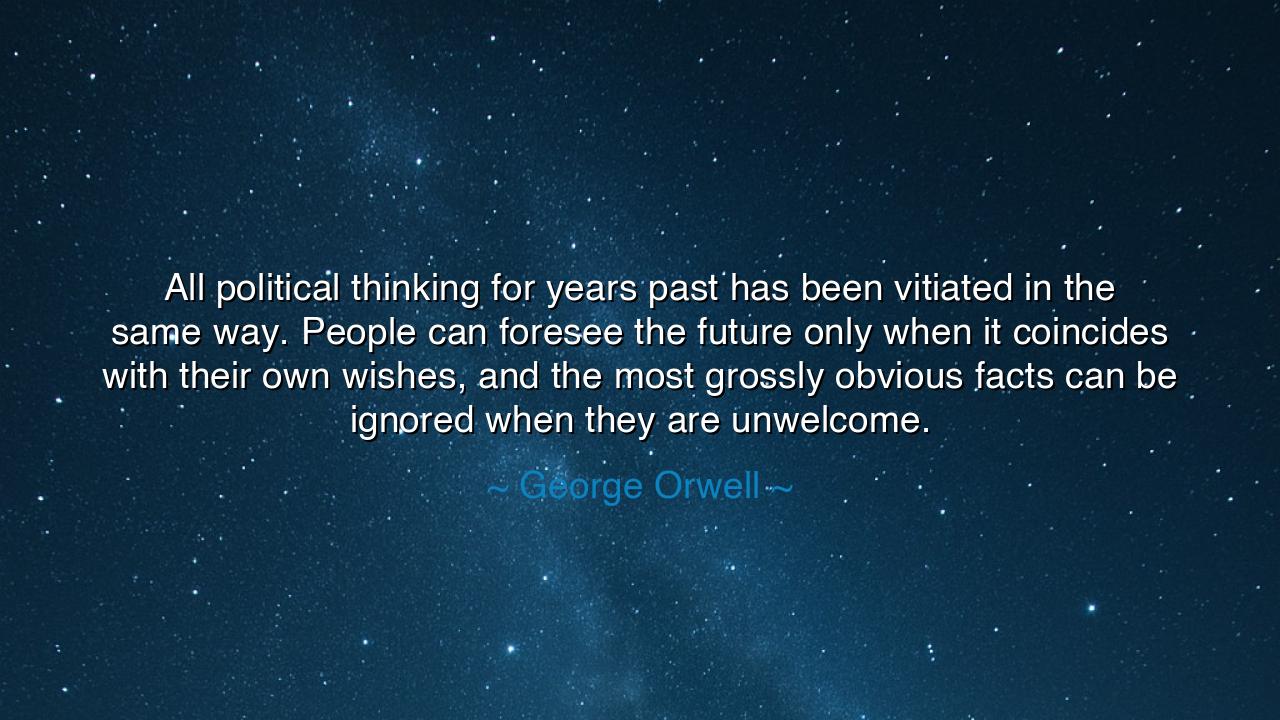
All political thinking for years past has been vitiated in the
All political thinking for years past has been vitiated in the same way. People can foresee the future only when it coincides with their own wishes, and the most grossly obvious facts can be ignored when they are unwelcome.






In the great theatre of politics, there has always been a temptation to shape reality in ways that align with personal desires and ambitions, rather than face the often uncomfortable truths that stand before us. George Orwell, in his powerful observation, "All political thinking for years past has been vitiated in the same way. People can foresee the future only when it coincides with their own wishes, and the most grossly obvious facts can be ignored when they are unwelcome," speaks to a timeless human tendency—the refusal to see the world as it is, preferring instead to mold it into something more comforting or convenient. Orwell's words strike at the heart of denial in political discourse, where truth becomes a casualty to the narrative people wish to believe.
In the ancient world, the Greek philosophers were among the first to explore the dangers of wishful thinking in the realm of politics. Plato, in his seminal work The Republic, cautioned against leaders who govern based on their own desires rather than the truth. Plato's allegory of the cave illustrates how individuals, living in ignorance, can be blinded by their own prejudices and unwilling to accept the harsh realities outside their understanding. For Plato, the pursuit of truth in governance was the foundation of a just society. In this way, Orwell’s criticism of political thought mirrors the wisdom of the ancients: the greatest threat to society is not just ignorance, but wilful ignorance—the refusal to face facts that challenge personal or ideological preferences.
Consider, too, the example of Socrates, whose unflinching commitment to the truth often led him into conflict with the political powers of his time. Socrates was not concerned with pleasing the powerful or popular; he was devoted to questioning assumptions, especially when they were held by those in authority. His relentless pursuit of truth, even when it made him unpopular, is a lesson in the danger of letting self-interest cloud judgment. In a world where political decisions are often guided by personal biases and desires, Socrates teaches us that real wisdom comes from acknowledging uncomfortable facts and embracing the truth, no matter how unwelcome it may be.
This same theme can be observed in the history of the Roman Empire, particularly in the rise of Julius Caesar. Caesar's ambition led him to manipulate both the political system and public perception, using his personal desires to shape the future he wanted to create. Despite the warnings of those who saw his consolidation of power as dangerous, Caesar ignored the facts that did not align with his own vision, eventually leading Rome into a period of civil war. Just as Orwell warned, Caesar was blinded by his own wishes, unable to see the destructive consequences of his unchecked power. His downfall illustrates the perils of disregarding the truth and shaping political thought solely around personal desires.
The lesson in Orwell’s quote is one of profound caution and self-awareness. He warns that politics driven by wishful thinking will always ignore the realities that are too inconvenient to face. This is not just a flaw in political systems; it is a flaw in human nature. We all tend to seek out truths that align with our prejudices, and we are often unwilling to accept facts that threaten our comfort or beliefs. Yet, as the ancients and Orwell alike teach us, progress and justice can only be achieved when we confront uncomfortable truths—whether they concern ourselves, our communities, or the world at large.
In our own time, the challenge remains the same: how do we confront the facts that are inconvenient to us, especially when they challenge our deeply held beliefs or desires? It is easy to be swept away by political rhetoric or to fall prey to echo chambers where only our own opinions are validated. But as Socrates, Plato, and Orwell remind us, true wisdom and progress come from the ability to acknowledge the truths that are inconvenient and difficult, not from ignoring them for the sake of comfort. We must cultivate the courage to challenge our own biases and to question the narratives that are too easily accepted, especially when they serve our personal interests.
The practical action we must take is clear: seek truth, even when it is uncomfortable. Whether in our political decisions, personal beliefs, or interactions with others, we must be willing to confront the facts that we may prefer to ignore. This is not always easy; the truth can be harsh, and it may force us to question long-held convictions. But as Orwell and the great philosophers taught, it is only by facing the uncomfortable that we can build a future that is grounded in reality and justice. We must resist the temptation to mold the world to fit our desires and instead, embrace the world as it is, knowing that growth and progress lie in our ability to adapt to and learn from the truth.






AAdministratorAdministrator
Welcome, honored guests. Please leave a comment, we will respond soon